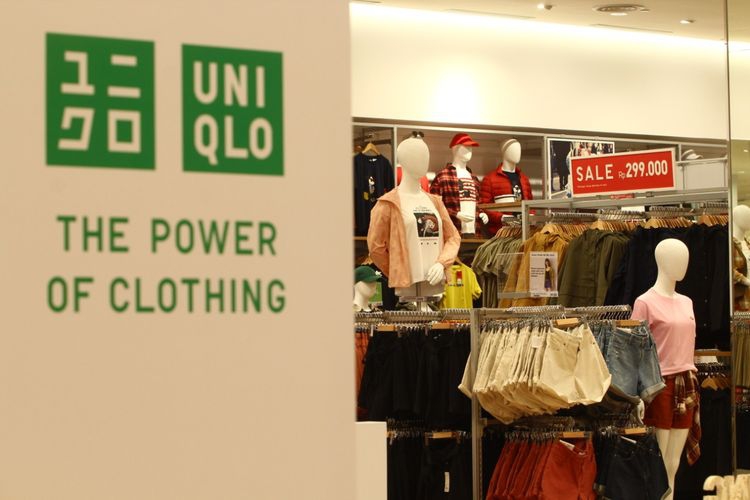UNIQLO INDONESIA INNOVATES BY USING A PLN RENEWABLE ENERGY CERTIFICATE
Uniqlo Indonesia is the first retailer to do so.

PT Fast Retailing Indonesia (UNIQLO Indonesia) has solidified its strategy to transition to a new business model based on sustainability principles by pledging to support the Indonesian government's efforts by using renewable energy generators to power all UNIQLO Indonesia outlets.
This commitment is stated in the Renewable Energy Certificate Sale and Purchase Agreement signed on Monday, December 13, 2021, in Jakarta by Shigeru Kumano, CFO of Fast Retailing Indonesia, and Edison Sipahutar, Executive Vice President of PT PLN (Persero), Corporate Customer Service and Large Institutions.
UNIQLO Indonesia became the first retail company in the Indonesian clothing sector to earn a Renewable Energy Certificate (REC) as proof of having used power from PLN's Renewable Energy Generator after signing the cooperation agreement.

"Our company places a strong emphasis on environmental stewardship in all of our business processes, from manufacturing to distribution and sales, decreasing greenhouse gas emissions and waste through the use of ecologically friendly manufacturing practices," said Shigeru Kumano, CFO of PT Fast Retailing Indonesia.
"UNIQLO Indonesia contributes through one of its projects, which is to adopt the usage of renewable energy-generated electricity in all UNIQLO stores in Indonesia."
The Kamojang PLTP in West Java generates this PLN REC, supplied using existing infrastructure. UNIQLO Indonesia is already employing renewable energy sources from PLN by using REC.
The purchase of the REC was intended to accelerate Indonesia's transition to renewable energy by ensuring that electricity consumption needs were met by Renewable Energy Power Plants, according to Edison Sipahutar, Executive Vice President of Corporate Customer Service and Large Institutions at PT PLN (Persero).
"This Renewable Energy Certificate is proof of Megawatt-hour (MWh) power output from Renewable Energy Power Plants, with one REC equaling one MWh of energy production," said Sipahutar.
"Currently, 70 firms from diverse industries, including UNIQLO Indonesia, are working to create a sustainable industry through the use of renewable energy electricity. More REC-equipped industries and businesses mean that Indonesia may reduce its reliance on non-renewable energy, easing the load on the environment."
The collaboration between UNIQLO Indonesia and PT PLN (Persero) will last two years from the cooperation agreement's signature date or until December 13, 2023. This commitment also represents UNIQLO Indonesia's support for the Paris Climate Agreement's goals of lowering greenhouse gas emissions by 2050.
Uniqlo's Commitment
Uniqlo is a well-known Japanese casual wear apparel store and brand with a global following. Customers love the affordable, simple designs, and collaborations with major character licensors like Disney keep them coming back for more.
View this post on Instagram
Ogori Shoji, a clothing firm, launched the "Unique Clothing Warehouse" in Hiroshima, Japan, in 1984. The trademark was agreed to be registered under the abbreviation "Uni-Clo", derived from the "Unique Clothing" component of the name.
The employees in charge of registering the name, however, mistook the "C" as a "Q", and the name stuck. The store's name was changed to Uniqlo, and ten years after its initial launch, Japan had over 100 of the popular casual apparel stores, including Indonesia.
UNIQLO Indonesia is committed to continuing its efforts to reduce greenhouse gas emissions through the supply chain and the consumption of UNIQLO products. Globally, Fast Retailing aims to employ renewable energy in 40 percent of UNIQLO locations and GU, UNIQLO's parent company. At least 64 UNIQLO locations in nine European areas have transitioned to renewable energy as of August 2021.
All stores in North America and some Southeast Asian nations will have completed the transformation by the end of 2021. Fast Retailing also published action plans for the fiscal year 2030 in September 2021.
The SBT initiative (SBTi) for sustainable business has approved these targets as Science Based Targets, which include producing high-quality, environmentally friendly clothing, reducing greenhouse gas emissions by up to 90 percent from stores, offices, and supply chains, reducing electricity consumption, increasing the proportion of recycled materials to around 50 percent, waste reduction initiatives, and creating a workplace that values diversity and inclusion.
#THE S MEDIA #Media Milenial #uniqlo #uniqlo indonesia #uniqlo pln #renewable energy certificate



























